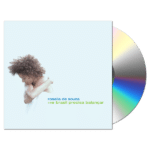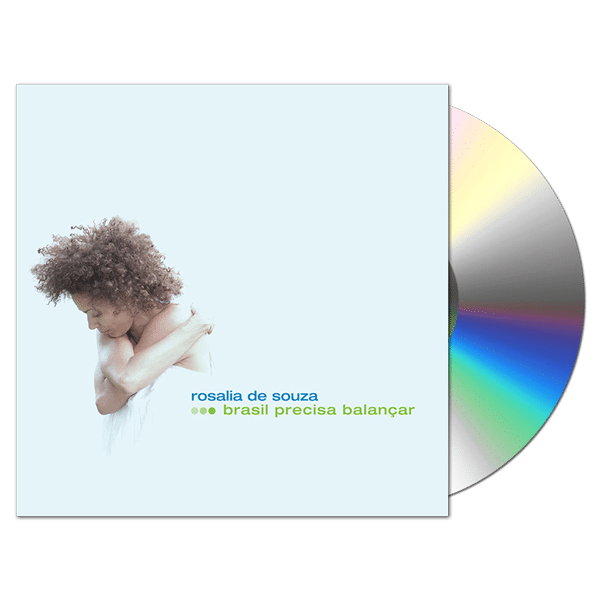With “Brasil Precisa Balançar” Rosalia De Souza goes back to her origins. Not so much meaning geographical latitudes, but rather as in rediscovering the roots of her own music. Brazil, through its culture and its philosophy of life, recalled Rosalia to a new dive into her hometown, Rio De Janeiro, from where she resurfaces more convincing than ever as artist formed from that very tradition. The Brazilian singer has recorded the whole album in the Carioca city assisted by the craftsmanship of Roberto Menescal, a true giant of original Bossa, who produced and arranged the entire album. Thus the feeling of this last work turns out completely different from the previous album ‘Garota Moderna’, where the sound was definitely more European. If in the debut album ‘Garota Moderna’ she already proved her value, with “Brasil Precisa Balançar” Rosalia De Souza achieves affirmation as Brazilian contemporary artist in perfect harmony with the rich past belonging to that particular songwriting tradition.
A display that lasts the full length of the album, where Rosalia’s delightful voice charms when singing cheerful and quirky with no other than Marcos Valle in ‘Que Bandeira’; then persuasively interpreting ‘Vivo Sonhando’ by the Maestro Jobim. Between these two columns of Brazilian music, who are Internationally renown, Rosalia moves gently all along, approaching either Bossa or Samba. Courtesy also of Roberto Menescal’s solid hand, author of the song “Brasil Precisa Balançar” from which the album’s title is taken. A guide, that of Menescal, able to even push Rosalia towards the interpretation of a more evocative and spiritual song such as “Jogo De Roda” by ‘mestre’ Edu Lobo, whose tones are ancestral.
Roberto Menescal, looked after every arrangement of the album with great expertise adding that extra value, which develops from experience, in-depth knowledge of music, and also from the ability to interpret a very own music genre. His CV is exceptional to say the least. In 1961 he wrote a Bossa Nova anthem composed with Ronaldo Bôscoli, “O Barquinho”. Roberto Menescal funded his band 3 years earlier (1958) with Luís Carlos Vinhas, João Mário, “Henrique” e “Bebeto”: the Conjunto Roberto Menescal. In 1959 he recorded his first composition “Jura de Pombo” (still with Ronaldo Bôscoli as co-writer), sung by “Alaíde Costa”. Between 1959 and 1961 Menescal played a pivotal role in promoting Bossa Nova within Brazilian culture, organizing concerts and festivals at the Univeristy in Rio. In 1962 besides going on tour with Eumir Deodato, he took part in the historical Festival of Bossa Nova at the Carnegie Hall in New York, with ” Tom Jobim” and “Carlos Lyra” amongst others. Between 1964 and 1968 he made his early experiences as arranger. In 1968, he accompanied “Elis Regina” in her performance at MIDEM in Cannes, and afterwards in the European tour of the singer. Until 1970 he acted as her ‘stooge’. From then onwards he gained fame as producer (working with artists the likes of “Caetano Veloso,” Gilberto Gil,” “Jorge Ben Jor,” “Gal Costa”, “Maria Bethânia” and many more). The last time he did a show in Italy was 2001, when he appeared at the Fare Festival in Pavia with ” Wanda Sá,” “Danilo Caymmi”, and “Marcos Valle”.
Menescal’s cure for details in producing the album “Brasil Precisa Balançar” lingers in the atmosphere of each track, where Bossa interchanges with Samba. The execution by the musicians stands out, nurtured from true feeling for music, both in delicate songs as well as in engaging, choral performances. A good example is represented by “Rio De Janeiro”, a tribute to Rosalia birthplace. “Agarradinhos”, is a passionate sentimental song written from Rosalia with Menescal. It tells about the singer’s admiration towards her Bossa guru; through this agarradinhos which means embraced. “Mar Amar” is another wonderful Bossa Nova composed by Menescal and Ronaldo Boscoli in the same period of “O Barquinho”, rearranged on this occasion and enriched by Rosalia’s singing. Another classic Samba from 1967 “Onde Anda O Meu Amor” written by Orlandivo and Roberto Jorge, in this album gets reworked in a more contemporary key, vaguely ‘samba canção’. Thus the listener is enticed by the invitation to sambare. A potential single. Certainly a single is 1 of the 2 Marcos Valle songs: “Que Bandeira”: beautiful tune written by Valle in the ’70, resulting even more appealing in duo with Rosalia. The other emotional song is “Ao Amigo Tom”. Homage to the Great Maestro Jobim, as well as heartfelt confession of sorrow for his loss.
Four songs in the album were written by Toco. Tomaz di Cunto, aka Toco, is an inspired artist emerging from the current Brazilian songwriting scene. He has already released an album on Schema Records, ‘Instalação Do Samba’, produced by S-Tone Inc. Tomaz is a songwriter of wide talent both lyrically and musically, in perfect tune with the classic Brazilian tradition. In “Brasil Precisa Balançar” this is proved by the songs where he assists Rosalia on vocals: the mesmerising “Nem Que Seja A Nado”; the enchanting “Voz Da Lapa”. As well as where Rosalia’s vocals are accompanied by the band: the gripping “Um Novo Dia” and the lovely “Rio De Janeiro”. The album ends with “O Que E’Amar” another very deep composition by Jhonny Alf, that stands as a real tribute to Bossa in the rarefied singing of Rosalia
In conclusion “Brasil Precisa Balançar” by Rosalia De Souza is a refined album always genuinely inspired; gentle but intense. A return to foundations, to carry on dreaming over the notes of immortal music.




